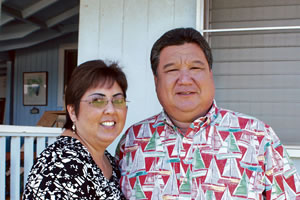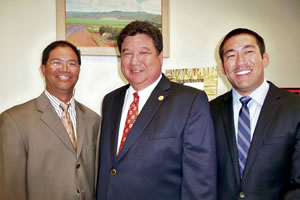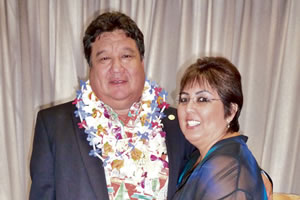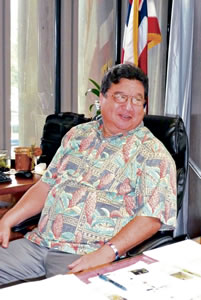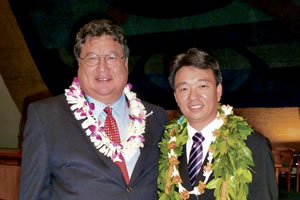Cookin’ in the Senate
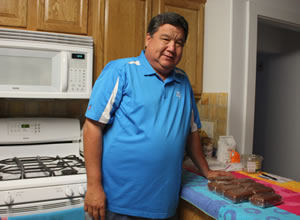
Whether it’s his homemade stew or, in this case, kulolo, Ron Kouchi knows the way to his fellow state senators’ hearts -- and votes -- is their stomachs. Amanda C. Gregg photo
Whether it’s his homemade stew or kulolo, Ron Kouchi knows that the way to a fellow senator’s heart (and vote) is the stomach
It’s a lazy weekend morning, and state Sen. Ron Kouchi and wife Joy have filled their house with the aroma of warm sugar. That’s because they’ve just finished up a batch of kulolo and are putting the slabs into neat little bundles. Though it might be easy to assume it’s Joy’s kitchen, she’s quick to point out it isn’t.
“Ron does all the cooking,” she says. “I’m a domestic diva.”
Whether it’s his chili, pot roast, stew or baked spaghetti, Kouchi’s cooking has become one of the most useful ways to network with key people when he’s in Honolulu at the Capitol.
“It’s how I lobby,” he says. “I end up bringing food, and whether it’s feeding our support staff or legislators, it’s certainly helpful.”
A public servant for 30-plus years, it’s that kind of down-home, low-key style that perpetuates Kouchi’s approachable vibe, which in turn helps keep him abreast of the issues facing Kaua’i residents. Perhaps not surprisingly, many are the same issues that motivated him to get into politics in the first place: the economy, sustainability, and taking care of our keiki, kupuna and everyone in between.It was returning home to Kaua’i in 1982 after working on O’ahu as a legislative analyst for former state Rep. Dennis Yamada that led Kouchi to run. It was a time when the Garden Isle seemed nothing more than a series of ghost towns.
“A lot of stores had plywood, had closed up,” he says, adding he was looking to reunite with friends with whom he went to school.
“There were very few of the people I grew up with on Kaua’i,” he says. “They all were looking for jobs elsewhere.”
Inspired to reverse that “brain drain,” a phenomenon that resulted in a decrease in Hawaii’s population growth as people started leaving the Islands in droves in search of better jobs, Kouchi thought if any entity could help the situation, it was the County Council.
“I wanted to vote for someone who would support the opportunity for people my age to choose to come back to Kaua’i and make it their home, but I realized there was nobody my age running,” he says. “I felt that before I would be forced to leave Kaua’i, I would try and do everything I could to stay here.”
That’s how Kouchi, a mere 24 years old at the time, ran for his first County Council seat. He would go on to serve 22 years (11 terms) as a Kaua’i County councilman including 12 years as Council chairman and two years as senator for District 7 (Kaua’i and Ni’ihau).
“I remember trying to introduce myself, and it was funny because the first thing I’d hear was, ‘How old are you?'” he says. “I knew I had finally made progress when that question changed to, ‘What is your position on housing, or the economy, or on issues in general.'”
Though he was young and single at the time, Kouchi says that even from his first term on the Council he “felt that if the day came to raise children,” he wanted to them to have the “experience of growing up and living on Kaua’i.”
For that to happen, the economy needed a boost. Admittedly pro-development back in the day, Kouchi, who later co-sponsored the charter amendment that created the Open Space Commission, says at the time the end justified the means: It created jobs and housing opportunities for local people.
“I wanted to bring back to Kaua’i those who had graduated from college or were done fulfilling military service commitments,” he says. “A lot of people who like to name-call would say, ‘You’re in this guy’s pocket,’ or whatever. But I’d say, ‘If you grew up here and saw our negative growth rate, it would make a strong impression on you.’ The desire to get jobs and opportunities for people was the priority. I guess at my age I see things a little differently in the world.”
It wasn’t long after he took office that Kouchi met his wife, a schoolteacher, in 1984. The couple was set up on a blind date by Joy’s first cousin, former County councilman Darryl Kaneshiro.
“Darryl was trying to sell tickets for a retirement party and I told him I already had a ticket,” Kouchi says. “He asked me if I was going with anybody, and when I said I wasn’t, he asked if he found me a date if I would pay for his ticket.”
That first date happened to be on a Tuesday, the same day as Council meetings, and of all things, the meeting went long.
“I didn’t make a good impression,” he says of being late, though he did attempt to make up for it by returning Joy home at a reasonable hour. “She was back by 9.”
The couple now has two sons, Dan, 22, and Egan, 20.
Over the years, raising a family in a rural community helped Kouchi relate to other families, but also dictated how he handled his campaigns. In 2002, he made a run for mayor against late former Mayor Bryan Baptiste. Though they ran against each other, he and Baptiste kept the race clean and civil.
“No one said anything disparaging about each other on the campaign trail,” he says, adding he conceded the race with sincere support. “Our eldest son was 12 at the time. We weren’t going anywhere, so what interest did I have in trying to see Bryan fail? It would have had a direct impact on my own family, because I was going to continue to raise my family here.”
“Working with Sen. Kouchi has been beneficial because of his wealth of experience and his willingness to share that knowledge openly,” says state Rep. Derek Kawakami. “Ron is definitely a family man and his guiding light is the future.”
No stranger to the economic woes the Garden Isle has faced over the years, Kouchi’s time in public office has spanned Hurricanes Iniki and Iwa, the United Airlines strike, the Persian Gulf War and 9/11. Of those less-than-positive milestones, Kouchi says he’s proud of the decisions he helped make. “We had financial challenges, but were able to meet those challenges and keep the county fiscally sound, and back up on our feet,” he says.
Looking ahead, Kouchi says job creation and dealing with high energy costs and solid waste are his areas of focus. Creating jobs by investing in repair programs, an initiative outlined in Hawaii SB 2012, is an idea he supports.
The bill would augment the repair and maintenance for local schools and public buildings.
“I think it will put people back to work quickly because these aren’t huge projects, and they’re on a small enough scale that the Kaua’i work force will be able to perform these jobs,” he says.
“It also will extend the useful life of our facilities at a time when repairing schools hasn’t been a budget priority.”
Pointing out that more development and “mega resorts” are a thing of the past, Kouchi says there “isn’t anyone in the world that’s looking to invest money to build a new hotel or knocking down the door to build a housing subdivision.”
Instead, he supports creating a “better, renewable portfolio,” ranging in everything from photovoltaic to biomass, the latter of which could help jumpstart cultivation as a land use.
“If we are able to successfully produce an economical biofuel from wood-chipping, algae or grass-type products, we could export it,” he says. “In addition to that, we have great solar power to utilize.”
Kouchi, former director of the Kaua’i Visitors Bureau and Kaua’i Island Utility
Cooperative, says biofuel could synergistically kill two birds with one proverbial stone, as lowering fuel costs would not only help local families but could make it more affordable for visitors to come to Kaua’i.
“It could affect ticket prices,” he says. “We always need to think of keeping a competitive edge. Mexico likes to say it’s ‘a lot cheaper than Hawaii.'”
As someone with a self-proclaimed passion for traveling with his family, Kouchi, also a baseball fan who grew up following legend Willie Mays, says his favorite family trips include going to New York to see the Mets play the Yankees and taking in a few Broadway shows.
But as wonderful as that was, the best is yet to come. “We’re hoping the most memorable trip will be when we all go to Caldwell, Idaho, in May to see Dan graduate (College of Idaho),” he says. “We’re all looking forward to it.”



